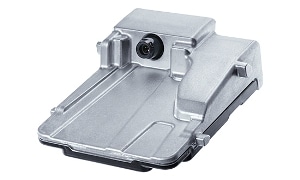Jan 31 2018
DENSO Corporation recently announced that it has developed a new standard vision sensor capable of detecting pedestrians, cyclists, driving lanes, road signs and other road users at night
 Vision sensor (Image credit: DENSO Corporation)
Vision sensor (Image credit: DENSO Corporation)
Working in tandem with a millimeter-wave radar sensor, the new vision sensor permits automobiles to automatically trigger emergency braking when obstacles are identified, reducing accidents and enhancing overall vehicle safety. It has been featured in the 2018 Toyota Alphard and Vellfire, which were released this January.
The new sensor demonstrates how DENSO supports the extensive adoption of safety technologies that will play a vital role in the progression of future mobility. It enhances night vision by employing a unique lens specially designed for low-light use and a solid-state imaging device with greater sensitivity. These innovations enable the sensor to better recognize other road users and different-shaped road signs, such as the rectangular, triangular, and octagonal signs used in Europe, Japan and the United States. An enhanced white-line detection algorithm and road-edge detection algorithm also widens the operating range of lane-keeping assistance and lane departure alert functions, while a 40% size reduction from earlier models decreases costs and allows installation to be easier.
DENSO has been developing products and technologies to help develop a society free from traffic accidents. These technologies are capable of supporting DENSO’s continued pursuit to deliver a secure and safe automotive society for people all over the world.